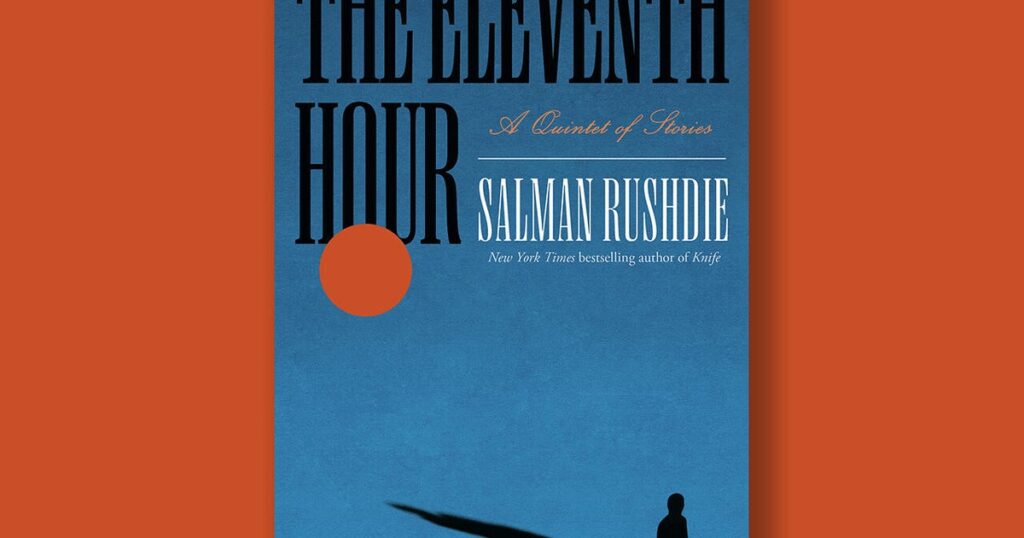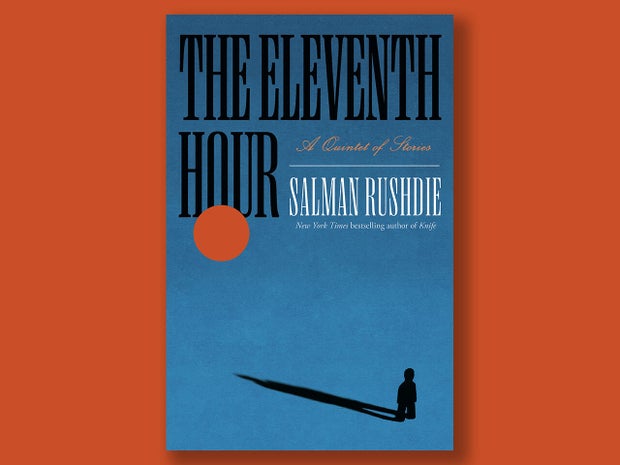Random House
We may receive an affiliate commission from anything you buy from this article.
“The Eleventh Hour: A Quintet of Stories” (to be published Tuesday by Random House) is acclaimed novelist Salman Rushie’s elegiac new collection of stories – his first fiction since a 2022 attack that nearly killed him – in which he writes of intimate encounters with death, ghosts, magic, and the immutable passage of time.
Read an excerpt below, and don’t miss Martha Teichner’s conversation with Salman Rushdie on “CBS Sunday Morning” November 2!
“The Eleventh Hour” by Salman Rushdie
Prefer to listen? Audible has a 30-day free trial available right now.
From “In the South”
The day Junior fell down began like any other day: the explosion of heat rippling the air, the trumpeting sunlight, the traffic’s tidal surges, the prayer chants in the distance, the cheap film music rising up from the floor below, the pelvic thrusts of an “item number” dancing across a neighbor’s TV; a child’s cry, a mother’s rebuke, unexplained laughter, scarlet expectorations, bicycles, the newly plaited hair of schoolgirls, the smell of strong coffee, a green wing flashing in a tree. Senior and Junior, two very old men, opened their eyes in their bedrooms on the fourth floor of a sea-green building on a leafy lane, just out of sight of Elliot’s Beach, where, that evening, the young would congregate, as they always did, to perform the rites of youth, not far from the village of the fisherfolk, who had no time for such frivolity. The poor were puritans by night and day. As for the old, they had rites of their own and did not need to wait for evening. With the sun stabbing at them through their window blinds, the two old men struggled to their feet and lurched out onto their adjacent verandas, emerging at the same moment, like characters in an ancient tale, trapped in fateful coincidences, unable to escape the consequences of chance.
Almost at once they began to speak. Their words were not new. These were ritual speeches, obeisances to the new day, offered in call-and-response format, like the rhythmic dialogues or “duels” of the virtuosi of Carnatic music during the annual December festival.
“Be thankful we are men of the south,” said Junior, stretching and yawning. “Southerners are we, in the south of our city in the south of our country in the south of our continent. God be praised. We are warm, slow, and sensual guys, not like the cold fishes of the north.”
Senior, scratching first his belly and then the back of his neck, contradicted him at once. “In the first place,” he said, “the south is a fiction, existing only because men have agreed to call it that. Suppose men had imagined the earth the other way up! We would be the northerners then. The universe does not understand up and down; neither does a dog. To a dog there is no north and south. And in the second place, you’re not that warm a character, and a woman would laugh to hear you call yourself sensual—but you are slow, that is beyond a doubt.”
This was how they were: they fought, going at each other like ancient wrestlers whose left feet were tied together at the ankles. The rope that bound them so tightly was their name. By a curious chance—which they had come to think of as “destiny,” or, as they more often called it, a “curse”—they shared a name, a long name like so many names of the south, a name neither of them cared to speak. By banishing the name, by reducing it to its initial letter, V., they made the rope invisible, which did not mean it did not exist. They echoed each other in other ways—their voices were high, they were of similarly wiry build and medium height, they were both nearsighted, and, after lifetimes of priding themselves on the quality of their teeth, they had both surrendered to the humiliating inevitability of dentures—but it was the unused name, that symmetrical V., the Name That Could Not Be Spoken, that had joined them together for decades.
The two old men did not share a birthday, however. One was seventeen days older than the other. That must have been how “Senior” and “Junior” got started, even though the nicknames had been in use for so long that nobody could now remember who originally thought them up. V. Senior and Junior they had become, Junior V. and Senior V. forevermore, quarreling to the death. They were eighty-one years old. If old age was thought of as an evening, ending in midnight oblivion, they were well into the eleventh hour.
“You look terrible,” Junior told Senior, as he did every morning. “You look like a man who is only waiting to die.”
Senior—nodding gravely, and also speaking in accordance with their private tradition—responded, “That is better than looking, as you do, like a man who is still waiting to live.”
Excerpted from “The Eleventh Hour” by Salman Rushdie. Copyright © 2025 by Salman Rushdie. All rights reserved. No part of this excerpt may be reproduced or reprinted without permission in writing from the publisher.
Get the book here:
“The Eleventh Hour” by Salman Rushdie
Buy locally from Bookshop.org
For more info:
https://www.cbsnews.com/news/book-excerpt-the-eleventh-hour-by-salman-rushdie/



